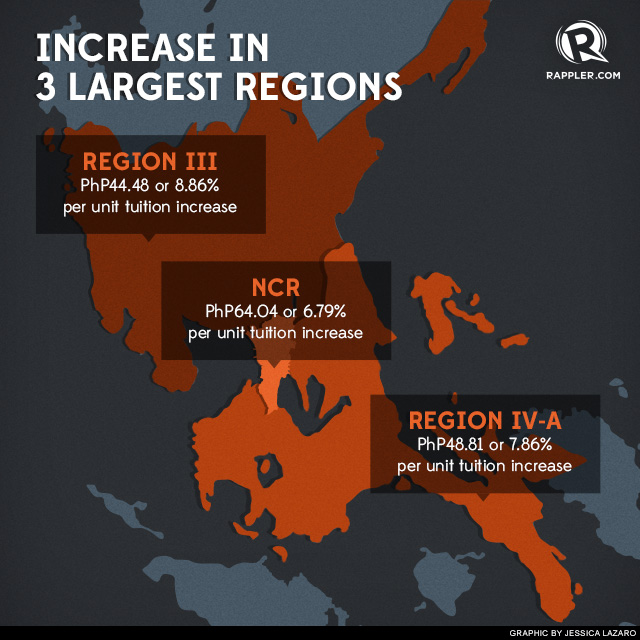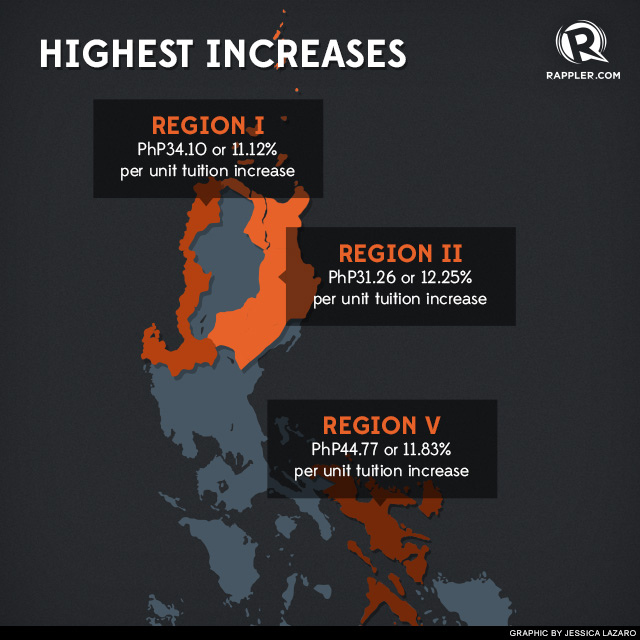SUMMARY
This is AI generated summarization, which may have errors. For context, always refer to the full article.
.jpg)
MANILA, Philippines – Compared with the previous year, more private colleges and universities will hike their fees when the school year 2013-2014 opens.
In an en banc meeting on Monday, May 27, the Commission on Higher Education (CHED) approved 354 petitions for increases in tuition and other school fees, or 78% of the total number of applicants.
CHED received more applications this year, according to its chairperson Patricia Licuanan.
Only 222 colleges and universities raised their fees during the previous school year.
Of the 1,683 private higher education institutions (HEIs) across the country, 451 or 27% filed petitions to raise their fees this year.

Highest increases
The average tuition hike per unit approved by CHED is P37.45 or 8.5% nationwide. It is the lowest percentage increase in the last 10 years, according to Licuanan. But militant students are opposing the increases.
“More students will be affected by the impending hikes. A 40-peso per unit increase translates to an 840-peso increase per semester if a student enrolls a full load of 21 units, or a 1,640-peso increase for the whole academic year – and that’s just on the average,” according to lawyer Terry Ridon, Kabataan party list president.
CHED approved the highest increases in regions II (P31.26 or 12.25%), V (P44.77 or 11.83%) and I (P34.10 or 11.12%).
In the 3 regions with the most number of colleges and universities, the increases were pegged at P64.04 per unit or 6.79% in the National Capital Region (NCR), P48.81 or 7.86% in IV-A, and P44.48 or 8.86% in III.
Meanwhile, the average increase in miscellaneous school fees is P194.62 or 7.58% nationwide.
“It’s clearly an additional burden for students and their families, especially at a time when prices of basic commodities are also increasing while salaries and wages remain flat,” Ridon said.

Tough times
While CHED successfully persuaded state colleges and universities to suspend proposals to raise their fees this year, it faced difficulty in encouraging the privates sector to follow suit. [READ: Public colleges to freeze tuition hikes?]
“We’re caught in between. As a matter of fact, we were successful with the state schools. At least (they) all promised to implement moratorium. But for the private schools, they need that and it’s their right in the law. So what we tried to do is just to truly discourage them,” Licuanan said.
Section 42 of Batas Pambansa Bilang 232 or the Education Act of 1982 allows private schools to “determine its rate of tuition and other school fees or charges… subject to rules and regulations promulgated by the Ministry of Education, Culture and Sports” (now Department of Education, Technical Education and Skills Development Authority, and CHED).
According to Licuanan, the private schools cited salaries for the faculty as the main justification for the tuition hikes.
“You have to show us also what you’re doing to respond because that is what people are asking, ‘Why are you increasing when times are hard.’ Then they said, ‘Times are hard for us also,’” Licuanan said, echoing the sentiments of the private sector. – Rappler.com
Add a comment
How does this make you feel?
There are no comments yet. Add your comment to start the conversation.